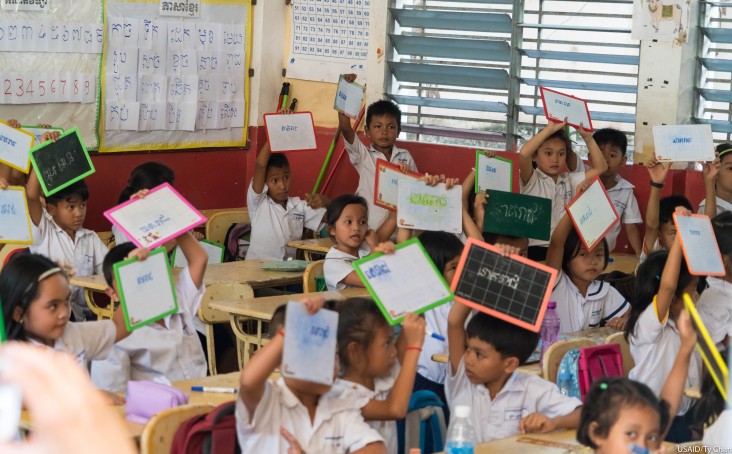Speeches Shim

EDUCATION
Cambodia has made significant improvements in education over the last several years. The Ministry of Education, Youth, and Sport (MOEYS) is close to achieving universal access to primary education; the country achieved a 97.7 percent primary net enrollment rate in 2016. Cambodia has also strengthened gender parity in education, with girls comprising 48.2 percent of primary students. Cambodia has built nearly 1,000 new schools in the last ten years and has invested significant resources to expand access to a quality education. The government has committed 18.31 percent of the national budget to education in 2016. The government has been undertaking education reform aiming to improve quality of education focusing on five pillars: 1) Implementing its teacher policy action plan, 2) Reviewing curricula and textbooks, and improving school environment, 3) Implementing inspection 4) Strengthening learning assessment, and 5) Reforming higher education. Despite the gains that have been made, Cambodia has one of the highest pupil-to-teacher ratios in the region, and only 32 % of female third graders (38% of male) are proficient in Khmer literacy.
ACTIVITIES
Early Grade Reading
In early 2017, USAID started a new early grade reading program to support the Ministry of Education, Youth, and Sports (MoEYS) to develop a harmonized and coherent national Early Grade Reading program. The five year program (2017-2021) aims to improve the reading skills of children in Kindergarten and grades 1-3 based on rigorous, evidence-based approaches that are feasible and practical in Cambodia, and can be taken to national scale. By providing embedded technical assistance to the MoEYS and building the capacity of key MoEYS technical department staff, USAID aims to:
- Enable the MoEYS to effectively manage evidence-based Early Grade Reading (EGR) programs at the national, provincial, district, and school levels;
- Achieve stronger partnerships and a more coherent collective approach to support early grade reading objectives in Cambodia; and
- Ensure that the early grade reading and writing programs that are endorsed and implemented in Kindergarten and grades 1-3 are feasible, practical, and scalable.
In particular, USAID will ensure the concept of inclusive education is integrated into early grade reading interventions so that all children -- including children with mild, moderate and severe disabilities -- have access to quality primary education.
CHILD PROTECTION
Photo credit: Children in Families. With the support of USAID, Children in Families provides foster care support to children in need of alternative care.
Cambodia is committed to improving child development and strengthening child protection services by addressing violence against children and the use of residential care institutions, or “orphanages.” With a national goal to reduce the number of children living in residential care by 30%, the Ministry of Social Affairs, Veteran and Youth Rehabilitation (MoSVY) is working to ensure the proper systems are in place to prevent child and family separation.
ACTIVITIES
Family Care First
In 2014, USAID launched Family Care First (FCF), a global initiative that seeks to identify and advance transformational solutions that considerably reduce the number of children growing up outside of safe, nurturing, family-based care. In 2015, Cambodia was selected as the first site to pilot this approach. Today, FCF is an ever-growing partnership, comprised of global and community partners from all sectors, committed to increasing the percentage of children living in safe, nurturing and family-based care. FCF partners are working together to build both the trust and evidence required to move toward making safe, nurturing family-based care a reality for every child in Cambodia.
Strengthening Child Protection Systems in Cambodia
USAID has partnered with UNICEF since 2012 to strengthen government systems and that ensure child protection services are available to children and families in Cambodia. Through the Partnership Program for the Protection of Children (3PC), thousands of children have received access to social services to reduce violence against children and reduce family separation. UNICEF has worked closely with MoSVY to strengthen national systems that protect children and respond to cases of child maltreatment.


Comment
Make a general inquiry or suggest an improvement.